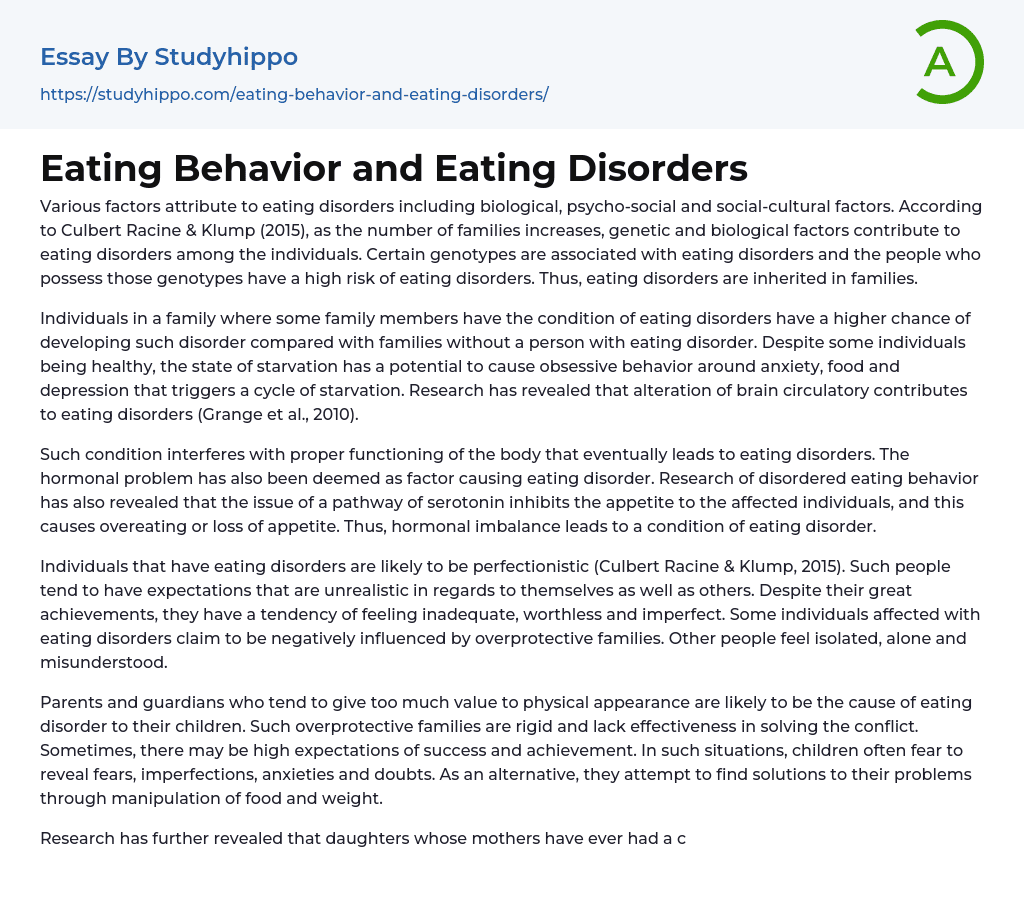According to Culbert Racine & Klump (2015), eating disorders can be caused by a variety of factors, including biological, psycho-social, and social-cultural influences. The researchers propose that when families grow in size, genetic and biological factors play a role in the development of eating disorders. Certain genotypes are linked to a higher chance of developing these disorders, indicating an increased risk for individuals with those genotypes. As a result, eating disorders can run in families and individuals who have relatives affected by these disorders have a greater likelihood of developing the disorder themselves compared to those from families without any previous cases.
Although certain individuals may be physically fit, the act of starving oneself can result in the development of obsessive behavior associated with anxiety, food, and depression. This leads to a continuous cycle of starvation. Various studies have indicated that alterations in brain circulation play a role in the emergen
...ce of eating disorders (Grange et al., 2010), causing disruptions in regular bodily functions. Furthermore, hormonal imbalances are also recognized as contributing factors to eating disorders.
Studies have indicated that disordered eating behavior can be influenced by disruptions in the serotonin pathway, which can cause individuals to experience either overeating or loss of appetite. Consequently, hormonal imbalance plays a role in the development of eating disorders. Individuals with eating disorders frequently exhibit perfectionistic traits (Culbert Racine & Klump, 2015) and establish impractical expectations for themselves and others.
Despite the impressive accomplishments of certain individuals with eating disorders, they experience feelings of inadequacy, worthlessness, and imperfection. They assert that their families' excessive emphasis on physical appearance adversely affects them, resulting in isolation, loneliness, and misunderstanding.
These protective families often encounter
difficulties in effectively resolving conflicts and may hold high expectations for achievement and success.
According to Grange et al. (2010), children in certain situations often conceal their fears, imperfections, anxieties, and doubts by manipulating their food and weight. The research discovered that daughters of mothers who have experienced an eating disorder are more vulnerable compared to those with mothers who have only had minor problems relating to food and weight. Furthermore, cultural factors also play a significant role in the development of eating disorders, particularly in societies that embrace Western values. Women feel compelled to adhere to societal pressure for thinness, which leads them to develop eating disorders as a means of controlling their body weight. In my opinion, it can be argued that eating disorders have a biological basis.
The development of eating disorders is significantly influenced by biological factors, which impact hormone levels and individual eating behaviors. These hormones are affected by the body's chemicals, leading to an excess production of serotonin in individuals with anorexia. This excessive serotonin causes prolonged stress and anxiety, reducing appetite and resulting in weight loss (Culbert Racine & Klump, 2015). Moreover, stress and anxiety also decrease calorie intake and lower serotonin levels in the brain, contributing to eating disorders. Research suggests that various brain hormones are associated with eating disorders as well (Ximenes, Couto & Sougey, 2010).
Hormones play a crucial role in regulating various bodily functions, including appetite and metabolism, which can ultimately contribute to the development of eating disorders.
References
- Culbert, K. M., Racine, S. E., & Klump, K. L. (2015). Research Review: What we have learned about the causes of eating disorders - a synthesis of sociocultural, psychological,
and biological research. Journal Of Child Psychology & Psychiatry, 56(11), 1141-1164.
doi:10.1111/jcpp.12441
doi:10.1002/eat.20751
Ximenes, R., Couto, G., & Sougey, E. (2010). Eating disorders in adolescents and their impacts on oral health. International Journal Of Eating Disorders, 43(1), 59-64.
The text below should beand unified, while preserving the and their contents:
Here is the DOI: 10.1002/eat.20660




